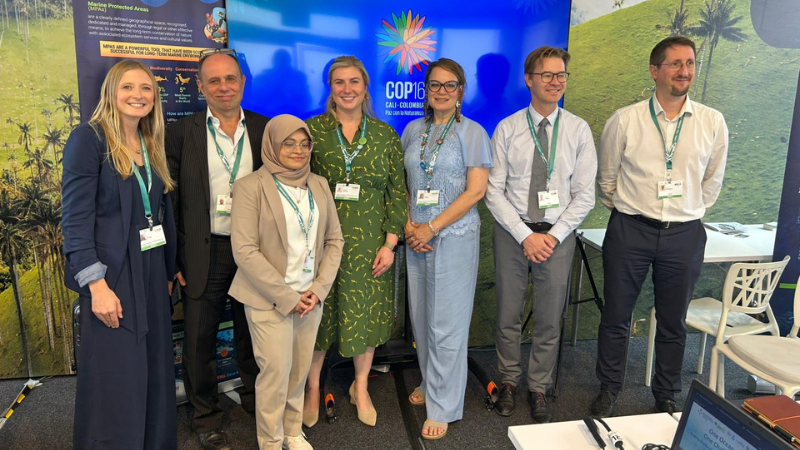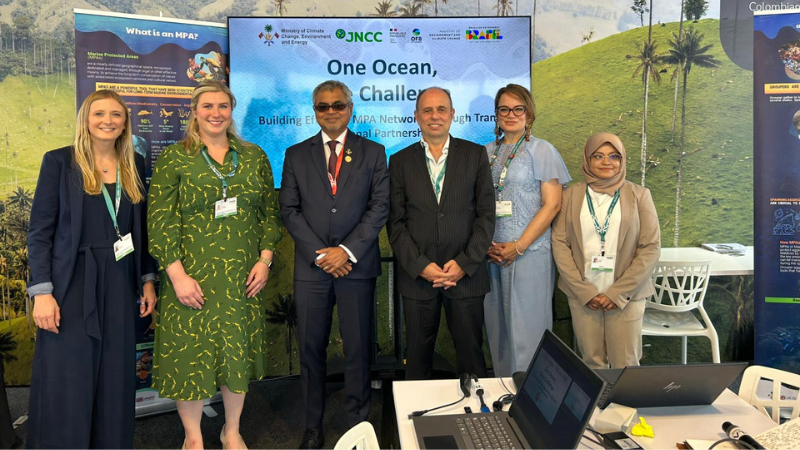We are running out of time to halt the accelerated decline in ocean health. Biodiversity within our global ocean is reported to be declining faster in the past 50 years than at any other point in history. This is already having dramatic repercussions on the livelihoods, well-being and health of society at large. Transformational change is now a global imperative if we are to first halt the loss of marine biodiversity, and to reverse the loss we need immediate action. In efforts to protect our global ocean, countries around the world have developed and expanded their protected area networks at sea significantly over the past two decades.
Our mission now is to ensure at least 30% of the global ocean is not only included within spatial protection measures, but that these effectively conserve and recover areas of particular importance for biodiversity and ecosystem functions and services in a way that is ecologically representative, well-connected and equitably governed. This mission, known as 30×30, is ambitious; we must work collectively to achieve it by sharing lessons learnt and best-practice at a global level.
30×30 is key to Target 3 of the Kunming-Montreal Global Biodiversity Framework (KM_GBF). At the 16th Conference of parties of the Convention of Biological Diversity in Cali, Colombia (COP16), parties from around the world have been coming together to discuss strategies for implementing this ambitious goal. COP16 also focussed on developing a robust framework for mobilizing the resources necessary for effective implementation of protected area networks. This is the first conference of the parties since adoption of the KM_GBF in Montreal during COP15 and so marks a pivotal moment in global efforts for the conservation of biodiversity. The overarching theme of COP16; “Peace with Nature”, underscores the importance of restoring our relationship with the natural environment on which we all depend, emphasizing that successful conservation efforts must prioritize both ecological integrity and social equity.
In addition to the negotiations during COP16, many discussions took place around the side lines at scheduled events. By example, on 30th October the Ministry for Climate Change, Environment and Energy, Maldives and the UK’s Joint Nature Conservation Committee (JNCC) co-hosted a side event to explore local and national experiences towards Target 3 of the KM_GBF.

The event started with welcome remarks from His Excellency Minister Thoriq Ibrahim, the Minister for Climate Change, Environment and Energy, Maldives. The Minister remarked that the ocean is a shared resource and protecting and conserving it should be a global imperative. The Chief Executive of JNCC Dr Gemma Harper also provided welcoming remarks, noting that we live on a blue planet and that establishing effective networks of MPAs will require global collaboration.
The event then moved on to a series of presentations that gave an insight into the progress being made by countries around the world. Olivier Thibault, the Director General of the French Biodiversity Agency, shared examples from collaborative projects from across metropolitan France. Pedro da Cunha e Menezes, the Director of MPAs at the Brazilian Ministry for the Environment and Climate Change, provided an overview of the Brazilian MPA network, and aspirations to identify additional areas in the future. Aishath Amal, on behalf of the Maldives, shared information about the progress of Protected and Conserved Areas across Maldives, highlighting the efforts being undertaken and visions being projected to protect and conserve the island nations rich biodiversity. Beth Flavell, on behalf of JNCC and the UK, presented on the UK’s work on 30×30 domestically, as well as summarising work that the UK are supporting to progress global 30×30 through international aid programmes such as the Ocean Country Partnership Programme and the International Partnership on MPAs, Biodiversity and Climate Change.
A key theme across COP16 has been the importance of collaboration and willingness to work across boundaries. This will become increasingly important in light of the BBNJ Agreement; a ground-breaking commitment for countries around the world to collectively advance protection in waters beyond any single nations jurisdiction.
What is evident from our discussions at the side event at COP16, and indeed amplified during the wider conference, is that it will be critically important for all of us to work collaboratively and across boundaries to achieve the ambitious Targets set out under the KM_GBF; our planet and future generations are depending on it. By fostering partnerships and sharing innovative solutions, we can enhance our collective impact and ensure that our conservation efforts are both effective and sustainable.
This article is written:
By Aishath Amal, Senior Conservation Officer, Environment Management and Conservation Department at the Ministry and Beth Flavell, International MPA Programme Manager, Joint Nature Conservation Committee, UK


